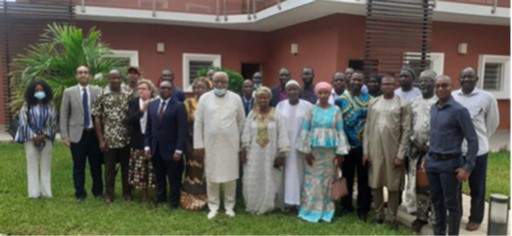By Nelson Manneh
The West Africa Network for Peace (WANEP), with support from GIZ on Tuesday, 19 July 2022 engaged political parties in The Gambia on Alternative Dispute Resolution (ADR).
The Gambia continues to grapple with an array of internal challenges within the realm of politics due to political tensions, including inter and intra-party conflicts, as well as inter-ethnic intolerance and polarization, according to the Concept Note of the multi-stakeholder consultation and training on ADR for political parties in The Gambia
The Concept Note added that the current political landscape of The Gambia is replete with tensions, disagreements, and a lack of consensus among political stakeholders over the leadership of political parties and the electoral processes.
“Politician opinion leaders and other interest groups on social media continue to use rhetoric and ethnic sentiments that deepen divisiveness and tensions in the country. In view of this situation, key state and non-state actors converged to discuss the best approach to address political-related conflicts, especially electoral disputes and violence,” the concept note indicated.
Ms. Salama Njie, WANEP Country Director, said over the past years, the country’s political system has been largely characterised by heightened political tensions and bickering, which has left the country divided.
She said the causes of these tensions and conflicts are multifaceted in nature, but they could be linked to weak political structures, politicised state institutions, and the absence of dialogue spaces and infrastructure for cultivating dialogue and national reconciliation.
“Politically motivated violence has been a recurring feature of elections in The Gambia. Politicians opinion leaders and other interest groups on social media continue to use rhetoric and ethnic sentiments that deepen divisiveness and tensions in the country,” she disclosed.
“Another justification for this intervention is premised on the existing capacity gaps in political party structures to address election-related disputes to minimise intra and inter-party-related violence.
“There is over-reliance on litigation to resolve those disputes within and between political parties. This suggests limited options of resolution mechanisms to address election-related conflicts.
“There is a need to strengthen mediation mechanisms in political party structures to resolve disputes. In this regard, ensuring that ADR is used effectively in election-related disputes is crucial.”
Honourable Amul Nyassi, the Co-chairperson of the Inter-Party Committee, said the engagement is crucial because it came at a time when The Gambia is preparing for the local government elections in 2023.
He said disputes are part of elections because living beings can have conflicting interests and that they can produce positive outcomes depending on how they are managed.
Nyassi said in their societies, some people and communities prefer resolving disagreements outside police stations and or courthouses using the already available embedded traditional value systems.
“In such instances, there will always be an authority that will command the respect of all and whose judgments would generally be accepted by the entities in dispute,” he said.
He pointed out that the inter-party committee is formed as an instrument of alternative dispute resolution.
“In order to enhance its performance, the IPC members have undergone training on mediation and conflict resolution in order to effectively mediate and resolve disputes depending on the nature and scope of such disputes. As political parties, the inter-party committees are fully conscious of the sensitive nature of politicking and notes its proneness to emotionally charged disputes,” he said.
Nyassi said a well-trained politician on alternative dispute resolution will have an enhanced capacity to build and maintain peace for an expansion of democratic space that will augur well for reconciliation of political differences in a less acrimonious manner
“My expectation of these three days engagements is that any knowledge gained from the interactions here will be a useful tool to the IPC, which will reinforce their know-how in mediation techniques to bring about agreements within and between political parties, as well as between political parties and the state,” he said.
















